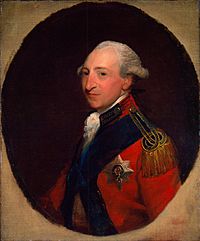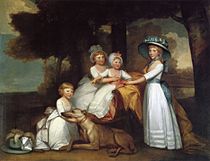Hugh Percy, 2nd Duke of Northumberland facts for kids
Quick facts for kids
The Duke of Northumberland
|
|
|---|---|

Portrait by Gilbert Stuart, c. 1788
|
|
| Personal details | |
| Born |
Hugh Smithson
14 August 1742 |
| Died | 10 July 1817 (aged 74) |
| Resting place | Northumberland Vault, Westminster Abbey |
| Nationality | British |
| Political party | Whig |
| Spouses |
Lady Anne Crichton-Stuart
(m. 1764; div. 1779)Frances Julia Burrell
(m. 1779) |
| Children | 9, including Hugh and Algernon |
| Parents | Sir Hugh Smithson Lady Elizabeth Seymour |
| Military service | |
| Allegiance | |
| Branch/service | |
| Years of service | 1759–1777 1798–1806 |
| Rank | Lieutenant general |
| Unit | 85th Regiment of Foot |
| Commands | Colonel of the 5th Regiment of Foot (1774) Percy Yeomanry Regiment (1798) Colonel of the Royal Horse Guards (1806) |
| Battles/wars | |
Lieutenant General Hugh Percy, 2nd Duke of Northumberland (born Hugh Smithson on 14 August 1742 – died 10 July 1817) was an important officer in the British army. He later became a British peer, which means he held a high rank in the British nobility. He fought in the American War of Independence, taking part in battles like Lexington and Concord and Long Island. However, he left his command in 1777 because he disagreed with his boss, General William Howe.
Contents
Early Life and Military Start
Hugh Smithson was born in 1742. His father was Sir Hugh Smithson. His mother was Lady Elizabeth Seymour. In 1750, his family changed their last name to Percy. This happened when his grandfather, Algernon Seymour, 7th Duke of Somerset, passed away. His father then became the Earl of Northumberland.
In 1759, when he was just a teenager, Hugh Percy joined the British Army. By age 17, he was already a captain in the 85th Regiment of Foot. This showed how much influence his family and wealth had. Even so, he was a brave soldier. He fought well in 1759 at the battles of Bergen and Minden.
After his military service, he went to St John's College, Cambridge in 1760. He married Lady Anne Crichton-Stuart in 1764. Her father was Lord Bute. In 1766, his father became a Duke. Hugh was then known as Earl Percy. He became a full colonel and an aide-de-camp (a personal assistant) to the King in 1764. People described him as honorable, brave, and very generous.
Fighting in the American War of Independence
Hugh Percy was a Member of Parliament from 1763 to 1776. He did not agree with the policies that led to the American War of Independence. Even so, he was sent to Boston in 1774. He held the rank of brigadier general there. He was also the colonel of the 5th Regiment of Foot. This regiment was later called the Northumberland Fusiliers.
Percy believed in treating soldiers well. He did not like harsh punishments. While other commanders used floggings, he led his soldiers by setting a good example. He was a Whig in politics. At first, he felt sympathy for the American colonists. But he soon disliked their actions.
The Battle of Lexington and Concord
Percy led the group that came to help the British troops at the Battle of Lexington and Concord. His smart decisions likely saved the British forces from a complete disaster that day. When his group arrived, they helped Francis Smith's tired troops. Percy carefully set up his forces to protect everyone. He also used his two cannons to break up large groups of American militia.
Even with Percy's help, the American leader, William Heath, managed to surround the British. The British had to march back under fire. When they found a bridge blocked in Cambridge, Percy quickly changed direction. He led his column down a hidden side road to Charlestown. This surprise move broke the circle of fire around his group. When American forces tried to block them again, Percy used his last cannon rounds to clear the way. After this, Percy began to respect the Americans.
Later Battles and Disagreements
Percy was not at the Battle of Bunker Hill. This might have been because of a disagreement with General Howe. Percy and Howe did not get along well. The next year, Percy commanded a division during the Battle of Long Island. He also led the attack on Fort Washington.
By 1777, he was a lieutenant general. But he became very unhappy with how General Howe was leading the war. He resigned his command and left America in 1777. One reason was a small argument about hay. More importantly, he disagreed with Howe about whether it was possible to move into the difficult New England area.
Life as a Duke

In 1786, Hugh Percy became the Duke of Northumberland after his father passed away. He continued his father's work to improve farming. For example, when corn prices dropped after 1815, he lowered the rent for his tenants by 25 percent. He held regular meetings at Alnwick Castle, inviting farmers and local business people.
He had a lot of influence in politics, even though he never held a government job. He was made a Knight of the Garter in 1788. He became a general in 1793. He took command of the Percy Yeomanry Regiment in 1798. In 1806, he became colonel of the Royal Horse Guards.
Hugh Percy, the second Duke of Northumberland, was known for being one of the richest men in England. He passed away suddenly in July 1817. He was buried in the Northumberland Vault inside Westminster Abbey. His son, Hugh Percy, 3rd Duke of Northumberland, became the next Duke. Hugh Percy also had a half-brother named James Smithson. James Smithson's gift later led to the creation of the famous Smithsonian Institution in the United States.
See also
- Bill Richmond, a man born into slavery in Colonial America. Percy freed him and brought him to England in 1777. Bill Richmond later became a famous boxer.
 | Sharif Bey |
 | Hale Woodruff |
 | Richmond Barthé |
 | Purvis Young |

